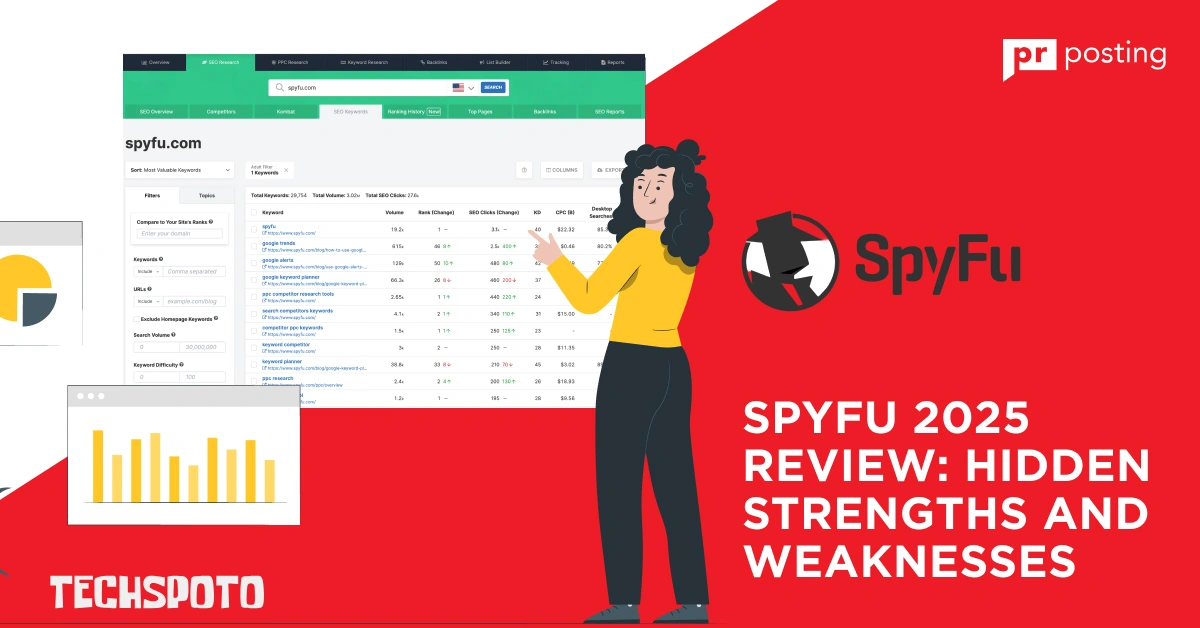
SpyFu is a competitor analysis and PPC research tool that reveals competitor keywords, ad strategies, and historical ranking data. It works via web scraping to track both organic and paid search trends, helping digital marketers optimize keyword strategy and ad spending based on 14+ years of historical search data.
You’re running a paid search campaign, but a competitor outbids you on every keyword. You need answers: What keywords are they targeting? What’s their monthly ad budget? Has this keyword always been profitable, or is it new? SpyFu solves this problem.
SpyFu is a competitive intelligence tool focused on keyword research and PPC analysis. Since 2006, it’s collected and analyzed search data from organic and paid channels. Unlike general SEO platforms, SpyFu doesn’t try to do everything—it focuses intensely on two things: revealing what your competitors bid on, and tracking how search trends have evolved over time.
The tool uses web scraping to pull ad data, keyword rankings, and SERP history. Think of it as a spy camera trained on your competitors’ search strategies. PPC managers and keyword researchers rely on SpyFu to reverse-engineer competitor campaigns and find untapped keyword opportunities.
SpyFu isn’t flashy, but its features are practical. Here’s what actually matters.
Want to know what ads your competitors are running? SpyFu keeps a complete record.
Enter a competitor’s domain, and you’ll see every keyword they’ve bid on, their estimated monthly ad budget, and the number of ads they’re testing. The Ad History tool is the real gem—it shows you the exact ad copy they ran, when they changed it, and how long each version stayed live.
Real-world example: Your competitor ran Ad V1 for three months, then switched to V2. If V2 stayed for six months, it likely outperformed V1. You can reverse-engineer their winning messaging and adapt it for your own campaigns.
The tool color-codes and changes so patterns jump out immediately. You also see average ad position and the percentage of time that the ad appeared at the top of search results—critical clues about performance.
Beyond paid search, SpyFu tracks organic rankings and keywords.
The SEO Keywords tool shows which keywords your competitors rank for, their current positions, and how many clicks those rankings generate. You can compare your rankings side-by-side with competitors’ to spot gaps. The Ranking History feature reveals trends: which keywords have climbed steadily, and which have crashed recently. This tells you what’s working for them and what isn’t.
Top Pages shows you which competitor pages drive the most traffic. If a competitor’s “How to” guide gets 5,000 monthly clicks, you now know that topic is worth creating content around.
This is SpyFu’s most distinctive tool.
Enter your domain and up to five competitors’ domains, and Kombat shows a Venn diagram of keywords: Core Keywords (all of you rank for), All Keywords (any of you target), Missing Keywords (competitors rank for, you don’t), and Questions (related searches).
More importantly, you can filter by search volume, keyword difficulty, and bounce rate. SpyFu highlights keywords competitors target that likely won’t send traffic (high bounce rate). This saves you time chasing dead-end keywords while you focus on high-value opportunities.
Setting up SpyFu takes five minutes.
Create an account, log in, and click “Create a Project.” Enter your domain and display name. SpyFu suggests competitors automatically based on market data—you can use their suggestions or add your own.
Your dashboard appears with six tabs: SEO Research, PPC Research, Keywords, Backlinks, Reports, and Tools. The search bar is centrally located. A region selector lets you focus on US, UK, or Canada data.
The interface is clean and uncluttered—a refreshing change from some SEO platforms that feel overbuilt. You can find what you need without a steep learning curve.
SpyFu doesn’t offer a free trial, but the free account lets you test features without a credit card. The paid tiers are straightforward.
Basic Plan: $39/month (or $33/month annually)
Professional Plan: $79/month (or $58/month annually)
The Basic plan works for small teams or solo marketers. The Professional plan is justified for agencies managing multiple clients who need deeper historical data and more tracked keywords.
By comparison, Semrush starts at $139/month, and Ahrefs at $129/month. SpyFu is the budget-friendly option—but you’re buying specialized depth in PPC and keyword research, not breadth.
Best fit:
Not ideal for:
SpyFu excels at one thing: revealing what your competitors bid on, which keywords drive their traffic, and how their strategy has evolved. It doesn’t claim to be an all-in-one platform—and that focus is its strength.
If your priority is understanding competitor keyword strategy and PPC campaigns, SpyFu delivers. Its historical data, affordable pricing, and clean interface make it a solid choice for agencies and marketers who live in keyword research and paid search.
If you need site audits, deep backlink analysis, or multi-channel insights, you’ll need to layer on another tool or switch platforms entirely.
For most PPC managers and keyword researchers, SpyFu pays for itself in the first month. Start with the Basic plan, test for 30 days, and upgrade to Professional if you need longer historical data or more tracked keywords.
SpyFu claims approximately 90% accuracy. Keep in mind that estimated metrics (ad budgets, traffic) are modeled, not verified. Use them as directional guides, not absolute truth.
No free trial, but a free account lets you test most features without a credit card.
Google Ads, Google Analytics, Google Search Console, Google Business Profile, and WriterAccess.
Yes. You can export keywords, competitor lists, and reports to spreadsheets or your project manager.